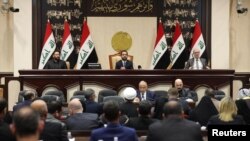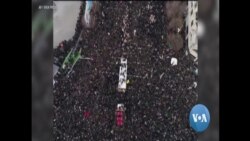U.S. President Donald Trump says the United States will not leave Iraq unless it is paid back for a U.S. air base it built there.
Trump was reacting to Sunday's Iraqi parliament resolution urging the government to expel 5,200 American troops.
Trump told reporters on Air Force One Sunday night that the U.S. has an "extraordinarily expensive" air base in Iraq that cost billions of dollars.
"We're not leaving unless they pay us back for it," he said, threatening sanctions "like they've never seen before" if the U.S. is not able to leave Iraq on a "very friendly basis."
The United States uses 12 different military facilities across Iraq. Trump did not specify which base he was talking about.
The Iraqi parliament demand for U.S. forces to get out was a protest against the U.S. drone attack at the Baghdad airport that Iran's top general Qassem Soleimani.
The Shi'ite majority in the parliament voted for the resolution calling on the caretaker government to end the bilateral agreement with the U.S.-led coalition to station troops on Iraqi soil.
U.S. Secretary of State Mike Pompeo expressed doubt U.S. forces would be expelled, telling Fox News Sunday, "We are confident the Iraqi people will want the U.S. to remain."
State Department spokeswoman Morgan Ortagus says the U.S. is "disappointed" by the Iraqi decision and is waiting for clarification of the legality of the move. She said the U.S. urges Iraq to change its mind.
"We believe it is in the shared interests of the United States and Iraq to continue fighting ISIS together. This administration remains committed to a sovereign, stable, and prosperous Iraq," she said.
The U.S. and Iraq agreed to the reintroduction of American troops in Iraq four years ago to help fight against Islamic State terrorists. That came after all U.S. troops had been withdrawn from the 2003 U.S. invasion force that eventually toppled Iraqi dictator Saddam Hussein.
Iraqi parliamentary resolutions are nonbinding. But caretaker Prime Minister Adel Abdul Mehdi had earlier urged parliament to take urgent measures and end the presence of foreign troops as soon as possible.
The prime minister called on lawmakers to act because of what he said were breaches of the troop agreement after the U.S. attacked a militia base in Qiam, which killed 25 Shi'ite militiamen, and the drone strike on Soleimani's car as he left the Baghdad airport.
But he said any decision on U.S. troops must make sure that Iraq's national interests and security are not damaged.
Riyad Muhammad Ali Al Masoudi, member of the Iraqi parliament, told VOA's Kurdish service, "We do not want to create a political or security void in this regard. What do we really want, is to preserve the Iraqi sovereignty and political future of the country. We hope this agreement will serve in the interests of Iraq, and will not be used against Iraq."
Meanwhile Lebanon's pro-Iranian Hezbollah leader Sheikh Hassan Nasrallah delivered a fiery speech to his supporters in Beirut urging the Iraqi parliament "to expel the U.S. from their country," and insisted that "the crime of killing (Qassem Soleimani) must be avenged."
Patsy Widakuswara, Kenneth Schwartz, Ed Yeranian, VOA Kurdish service contributed to this report.















